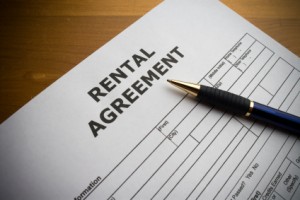Posted by Teresa on August 5, 2013 under Lease and Rental Agreements, Legal | 
 Where do you obtain your leases and other legal documents? Many landlords and property managers download them from the Internet, which is fine—but it’s always best to have a lawyer who is versed in landlord-tenant law look it over before you sign on the dotted line.
Where do you obtain your leases and other legal documents? Many landlords and property managers download them from the Internet, which is fine—but it’s always best to have a lawyer who is versed in landlord-tenant law look it over before you sign on the dotted line.
If you don’t have a lease prepared or approved by a legal professional, you could be setting yourself up for trouble without even realizing it. How? By either not understanding the terms of your lease, or by using one that is not applicable in your state.
We learned recently of a new landlord whose lease terminology bit her in the foot. While she thought that she made it clear that pet deposits were non-refundable, she actually states in the lease that the entire amount she was charging ($500) was completely refundable! Here is the language she used:
“Tenant shall pay to Landlord a pet deposit of five hundred dollars, zero dollars of which shall be non-refundable.”
If zero dollars are non-refundable, then the rest must be refundable, right? In addition, the lease stated that the pet deposit would be used for the purpose of cleaning the carpet. A tenant could argue that if the carpets did not need cleaning upon the termination of the lease, the landlord was not entitled to the funds. There were no other possible uses stated, so the landlord could not use the deposit to repair carpet or flooring, replace moldings, or fix any other items a dog or cat might have damaged.
Unfortunately, the landlord did not realize her mistakes until a tenant with a dog moved out and demanded the entire pet deposit returned. The tenant understood that the entire deposit was, indeed, refundable according to the lease they both signed.
The lesson here is to not only understand the terms of your own lease, but to write the lease in plain English. If you want to charge a non-refundable pet deposit, then say so. Don’t add in conditions or uses for the deposit, such as cleaning carpets.
And finally, seek expert advice on lease questions and other legal matters. It’s worth it in the long run!
Posted by Teresa on June 13, 2013 under Legal | 
 A new study by the U.S. Department of Housing and Urban Development found that minorities who seek rental housing, as well as those wishing to purchase homes, are experiencing racial bias.
A new study by the U.S. Department of Housing and Urban Development found that minorities who seek rental housing, as well as those wishing to purchase homes, are experiencing racial bias.
Since 1977, HUD has conducted the study once each decade, in an effort to monitor trends in racial and ethnic discrimination in both the rental and sales markets. The studies have found that reports of blatant discrimination against minorities (such as refusing to meet or provide any information) have declined, but there is still evidence of bias.
In the study, white, black, Hispanic and Asian testers inquired about available units over 8,000 times in 28 cities. In each test, one white and one minority contacted a housing provider to inquire about a randomly selected, recently advertised home or apartment. The testers were matched by gender and age, and presented themselves equally well-qualified to rent or buy the advertised unit.
In markets across the country, white testers were told about and shown more units. When compared to whites, black testers were told about 11% fewer rental units and 17% fewer homes for sale, and were shown 4% fewer rental units and 18% fewer homes for sale.
Asians were told about 10% fewer rental units and 15% fewer homes for sale, and were shown 7% fewer rental units and 19% fewer homes for sale. Hispanic testers were told about 13% fewer rental units and were shown 8% fewer rental units, but when inquiring about homes for sale, when they were treated similarly to whites.
In one test, a white tester arrived first and asked to see a two-bedroom apartment. He was shown both a two-bedroom and a one-bedroom unit, and provided applications for each. Two hours later, a Hispanic tester arrived at the same office and was told nothing was available.
In another test, a black tester was told by a real estate agent that she needed to prequalify for a loan before she could see homes for sale. The agent refused to meet with the tester until she had talked to a lender. A white tester called the same agent, was not told about prequalifying, and was able to make an appointment.
Discriminating against prospective tenants on the basis of race, ethnicity, gender, family status, religion or disability is against the law. But as this study shows, that doesn’t mean it doesn’t happen.
Start your tenant relationship off right by knowing who you’re leasing to. Protect your rental property and assets with tenant background checks. Proper tenant screening will ensure you are leasing to the best possible tenants.
Posted by Teresa on April 5, 2013 under Housing Trends, Legal | 
 Not everyone loves a landlord. Some homeowners dislike having too many rental properties in their neighborhoods. They think that rentals decrease property values and degrade the community.
Not everyone loves a landlord. Some homeowners dislike having too many rental properties in their neighborhoods. They think that rentals decrease property values and degrade the community.
One town decided to take steps to limit the number of rentals allowed in a neighborhood. West St. Paul, Minnesota passed a law, effective January 1 of this year, which permits no more than 10% of homes on a block to be rental properties.
West St. Paul has had more than its share of foreclosures. Home values have fallen. But there’s little evidence that the number of tenants living in its neighborhoods has anything to do with it. Studies provide mixed results; some say higher rates of homeownership raises home values, but others conclude that even large, mixed-income, multifamily rental properties don’t affect the values of surrounding single-family homes.
Besides, with all the foreclosures in the town, where are former homeowners supposed to live? Not in West St. Paul. And not in Madison, Mississippi, which banned all rentals in 2009. In addition, what about homeowners who need to sell a home to take a better job elsewhere, but are unable to sell? What if they’re not allowed to rent their home? How many will walk away from their mortgages and ruin their credit history?
Not surprisingly, homeowners are not taking this lying down. They’re filing lawsuits, claiming that renting one’s own property is a legitimate property right.
Municipalities might mean well by limiting the number of rental properties on a block, but it seems like a recipe for disaster. Americans are demanding more flexible housing, with less upkeep and expense , the ability to move at the end of a lease without penalty and no worries about falling home prices wiping out their equity.
If surrounding homeowners worry about their home values, they can insist on stronger laws that support landlords’ efforts to keep their properties in good shape, and limit noise and other nuisances. They can get to know the landlord and the tenants that own and live in the rental properties in their neighborhoods. Communication is a better way to start than passing laws to prevent property owners from leasing their properties.
Posted by Teresa on March 26, 2013 under Legal | 
 The Fair Housing Act (FHA) governs rental properties, requiring landlords to follow all laws established under the Act. Owners of rental properties may not discriminate on the basis of religion, sex, race, family status, national origin, or disability.
The Fair Housing Act (FHA) governs rental properties, requiring landlords to follow all laws established under the Act. Owners of rental properties may not discriminate on the basis of religion, sex, race, family status, national origin, or disability.
Under the disability section of the FHA, it states that landlords must make reasonable exceptions to their policies to ensure that people with disabilities receive equal housing opportunities.
This means that if you have a no-pets policy, you may be required to make an exception for service or companion animals that people with disabilities depend on to manage their lives.
But not all disabilities are obvious. The Americans With Disabilities Act (ADA) defines an individual with a disability as “a person who has a physical or mental impairment that substantially limits one or more major life activities, a person who has a history or record of such an impairment, or a person who is perceived by others as having such impairment.”
It’s a broad definition, but that doesn’t necessarily mean that every animal kept by a person with disabilities must be allowed. Not all dogs are service dogs—some are simply pets. Certain court cases have ruled in favor of landlords, such as when a dog owned by person with a hearing impairment was found to be completely untrained, and not an assistance animal at all.
Other examples include a case where a property management company changed its pet policy to ban all animals. One tenant had lived there for years, and owned a dog. When it came time to renew his lease, he was asked about whether he would be giving the dog away or leaving his apartment to comply with the new policy. He stated that since he’d been in an accident a year before, he needed his dog as a companion animal. He supplied evidence from his physician, and was allowed to keep his dog.
If you have an issue with a tenant over whether or not the service or companion animal they’re keeping truly fits the definition, consult your attorney. Keep in mind that some disabilities, like heart trouble, depression and diabetes cannot be seen. Assuming your tenant does not have a disability can be considered discriminatory in itself. Be sensitive, proceed with caution, and give your tenant the respect he or she deserves.
Posted by Teresa on March 7, 2013 under Landlord and Tenant FAQs, Legal | 
 A landlord recently asked a question regarding firearms:
A landlord recently asked a question regarding firearms:
“Since the Newtown, Conn. shooting, I’ve been thinking that I’d rather not have any guns in my properties. I’m concerned that a tenant or a child could be shot by accident or as a result of a domestic disturbance. And what if a shot went through the wall to another tenant’s apartment? Can I ban firearms?”
It’s true that guns and gun laws are a hot news topic. Many landlords are wondering if they have the right to ban firearms from their properties. The answer in most places is “yes.” It’s always best to check your state and local laws to be sure. Minnesota, for example, does not allow landlords to restrict the lawful carry or possession of firearms by tenants or their guests.
While the second amendment to the U.S. Constitution is widely quoted by firearms owners and enthusiasts, it only covers the government’s response to guns held by private citizens. Just as landlords can ban pets, waterbeds and campers, they can ban guns from their properties.
If they prefer to keep a gun-free property, landlords can choose not to rent to gun owners, who, unlike persons with disabilities or other groups, are not a protected class.
Now, we’re not saying that banning guns will make a landlord more popular. It might make prospective tenants angry. Some gun owners might ignore the rule and bring guns onto the property anyway. If you do find a firearm on the property, the tenant would be in breach of the lease.
But if you feel better instituting a no-guns rule, check with an attorney versed in landlord-tenant law, or check your state’s gun laws before instituting it. For tenants with current leases, you’ll have to wait until renewal to add the new provision. Some may choose to move out. And of course, once you have a signed lease, you would not be allowed to conduct a search of a tenant’s unit to look for firearms.
Posted by Teresa on March 1, 2013 under Landlord Tips, Legal | 
 First of all, let it be known that we do tenant screening—not tax returns. Therefore, please do not construe this post as tax advice. Get that from a professional. The following is general information that landlords might find useful.
First of all, let it be known that we do tenant screening—not tax returns. Therefore, please do not construe this post as tax advice. Get that from a professional. The following is general information that landlords might find useful.
The housing bubble turned lots of homeowners into landlords, when they couldn’t sell their properties and instead had to rent them out to tenants. These new landlords may not realize what veteran rental property owners know: that one of the advantages of being in the business is the opportunity to offset income by deducting certain expenses from their tax returns.
When you own rental property, you can generally deduct the following:
- Mortgage interest
- Depreciation
- Taxes
- Insurance
- Maintenance and upkeep
- Utilities paid by you
- Upgrades to rental units
- Advertising expenses
- Professional fees (tax advisor, lawyer, bookkeeper)
- Website expenses
- Local travel (including meeting with tenants, checking on units, traveling to hardware stores for parts, etc.)
- Long distance travel related to rental properties
- Cleaning expenses
- Painting, carpet replacement and other repairs done between tenants
- Home office expenses
Rental property offers other benefits, as well. Remember, one day the mortgage will be paid off and the income can help with your retirement, too!
Find a good tax advisor and make sure you get all the deductions you’re entitled to. Make your rental property work hard for you, and don’t pay more in taxes than is required.
Posted by Teresa on January 30, 2013 under Landlord Tips, Legal | 
 If you’re guessing that New York City or Los Angeles is the bedbug capital of America, guess again: it’s Chicago. And in response to this “honor,” the city’s aldermen are introducing legislation to address the problem of increasing infestations of bedbugs in city residences.
If you’re guessing that New York City or Los Angeles is the bedbug capital of America, guess again: it’s Chicago. And in response to this “honor,” the city’s aldermen are introducing legislation to address the problem of increasing infestations of bedbugs in city residences.
Unfortunately, the proposed law is targeted at landlords, and calls for fines of up to $1,000 a day if they don’t deal with bedbug infestations. As one property manager said, this type of one-sided legislation simply “opens the doors for tenant rights lawyers to take advantage—and only they win.”
Landlords with experience know that bedbugs are a shared responsibility. The pests can certainly cause tenants many sleepless nights and the misery of painful bites. And most landlords are willing to take the necessary and costly steps to get rid of bedbugs.
However, when tenants fail to do their part to fight bedbugs, it becomes an unfair burden to any landlord. Two ways tenants can help are inspecting their units frequently and being more vigilant against bringing bedbugs home after traveling.
According to the proposed ordinance, landlords would be required to hire pest management professionals “as many times as necessary to eliminate the bugs.” They would also be required to maintain records of their efforts. Current Chicago law requires landlords to treat bedbug infestations only when two or more units are affected, and doesn’t require any record keeping.
Landlords say that education and vigilance are much more effective against bedbugs than legislation.
Start your tenant relationship off right by knowing who you’re leasing to. Protect your rental property and assets with tenant background checks. Proper tenant screening will ensure you are leasing to the best possible tenants.
Posted by Teresa on December 7, 2012 under Landlord Tips, Legal | 
 The trend in rental properties is definitely swinging toward smoke-free. Tenants are demanding it, an landlords are seeing that the liability and costs associated with smoking inside rental properties makes it difficult to keep allowing it.
The trend in rental properties is definitely swinging toward smoke-free. Tenants are demanding it, an landlords are seeing that the liability and costs associated with smoking inside rental properties makes it difficult to keep allowing it.
Many tenants are sensitive to cigarette smoke. Even if you thoroughly clean the unit, paint, replace carpets and change out the blinds, some tenants will still smell the odor of the previous tenant’s smoke. It just doesn’t make for a pleasant living situation, and you could lose a good tenant over it.
Old cigarette smoke is a health risk, too. Particulates in the exhaled smoke stay around for longer than you might think. They are in the dust floating around in the air; they settle in cracks and crevices; and they set the stage for long-term health problems—particularly for children and individuals with lung or breathing issues, such as asthmatics. New studies show that it’s not just second-hand smoke that is potentially harmful. In other words, you don’t have to directly breathe in someone else’s smoke to be harmed—you could be in a room today that someone smoked in yesterday, and still be affected.
A study a couple of years ago focused on 5,000 children who lived in smoke-free residences, both detached and multi-family. It found that overall, 73% of the children were still exposed to tobacco—but those who lived in apartment buildings had much higher instances of nicotine in their blood (84.5%, compared to 70% of kids in detached homes).
The poisons and chemicals in tobacco smoke linger. They travel down hallways, and through ducting and shared walls. The long-term affects on children and other vulnerable populations are not known now. But do you want to be partly responsible for a child’s future health problems? Turning your rental apartments into smoke-free housing is good for everyone—your current tenants, your future tenants and their children, who are the most innocent victims of other people’s smoking habits.
Posted by Teresa on November 14, 2012 under Landlord Tips, Legal | 
 If you’re a new real estate investor—having purchased property to rent out in 2012—you may qualify for special tax breaks on improvements. But you’ll have just a few months to make them.
If you’re a new real estate investor—having purchased property to rent out in 2012—you may qualify for special tax breaks on improvements. But you’ll have just a few months to make them.
Many new landlords jumped into the business this year, as prices dropped and demand rose. Vacancies are down throughout the country, and rents have been projected to stay stable for the next few years. For lots of investors, 2012 was a good year to get into the real estate rental market.
Attracting quality tenants is perhaps the most important thing to learn for new landlords. But what do good tenants want? In most cases, they want to feel comfortable and safe. For higher-end properties, they also want amenities like wood floors, tile bathrooms, gas fireplaces and upgraded appliances.
If you’re a new landlord thinking of making improvements to your property, ask your tax advisor about the IRS Bonus Depreciation of “personal property improvements” and Increased Section 179 Deduction. Briefly, this section of the tax code allows businesses to write off most or all of the purchase price of qualifying equipment and depreciate updates made in the first year of ownership, with certain limitations and restrictions. It was enacted after 9/11 to encourage businesses to invest in themselves.
December 31 2012 is the deadline; new landlords could qualify for breaks on improvements if they move fast. Some improvements, such as cabinets or new tubs, don’t qualify because they are part of the property. But new appliances, floor coverings, fixtures and paint could qualify—and could help you compete for the best tenants.
Of course, it’s always wise to consult a tax expert BEFORE spending any money that you think you’ll be able to deduct as an expense or depreciate.
Disclaimer:
The contents of this article are intended for general information purposes only, and should not be relied upon as a substitute for obtaining financial or tax advice applicable to your situation. Please consult your tax advisor.
Posted by Teresa on October 30, 2012 under Landlord Tips, Lease and Rental Agreements, Legal | 

Landlords and property managers have the right to enter their properties, with proper notice to their tenants. Whether it’s for routine maintenance work, pest treatments or safety inspections, it’s not only necessary to occasionally enter a tenant’s unit, but it’s a good idea to do so. You need to know what’s going on in your properties.
During these routine inspections, landlords and property managers sometimes see things that tenants don’t intend for you to see, such as:
- Ashtrays, cigarette butts and lighters.
- Pet supplies, like food dishes and litter boxes.
- Drug paraphernalia like pipes, lighters and syringes.
- Illegal drugs, such as marijuana or cocaine.
- Evidence of drug manufacturing.
- Signs of a business being run out of the unit.
What can (and should) you do when this happens? Can you evict the tenant? If the occupant is otherwise a good tenant, should you ignore it? First, it’s always important to be familiar with your state’s laws regarding grounds for eviction. But if any of the activity you have witnessed violates the terms of your lease, you probably do have grounds for eviction.
If you’d rather not go that route, then it’s possible to wait until lease renewal time comes around, and inform the tenant that the lease will not be renewed. Of course, you’ll need to provide proper notice, according to the terms of the lease.
Reasons to Consider Eviction or Non-Renewal of a Lease
- Liability: Landlords can be liable for criminal activity that occurs on their properties—even if they are not aware of it. Landlords can be liable for injuries that occur as a result of illegal activity. Landlords can be liable for injuries caused by a tenant’s pet—even if they are not aware of the pet. Laws vary from state to state, but why take chances?
- Health: Smoking in units where it is not allowed can affect other residents, including children. Second-hand smoke carries chemicals and carcinogens through vents, doorways and windows. In addition, cigarettes are the cause of accidental fires.
- Safety: Each year, almost 1,000 smokers and non-smokers are killed in fires caused by cigarettes and other smoking materials.
- Fairness: If most tenants follow your rules, such as not running a business out of the rental unit, it’s not fair to make exceptions for someone who ignores the lease. Charges of discrimination could follow.
Strict and equitable enforcement of rental agreements should be every landlord and property manager’s practice. If tenants are conducting illegal or criminal activities or are breaking the terms of their leases, your best move is to get them out and replace them with tenants who will follow the rules and abide by the lease.
And if you need to, amend your lease agreement to include a paragraph prohibiting drugs and other illegal activities on your property.
Start your tenant relationship off right by knowing who you’re leasing to. Protect your rental property and assets with tenant background checks. Proper tenant screening will ensure you are leasing to the best possible tenants.
 Where do you obtain your leases and other legal documents? Many landlords and property managers download them from the Internet, which is fine—but it’s always best to have a lawyer who is versed in landlord-tenant law look it over before you sign on the dotted line.
Where do you obtain your leases and other legal documents? Many landlords and property managers download them from the Internet, which is fine—but it’s always best to have a lawyer who is versed in landlord-tenant law look it over before you sign on the dotted line.








